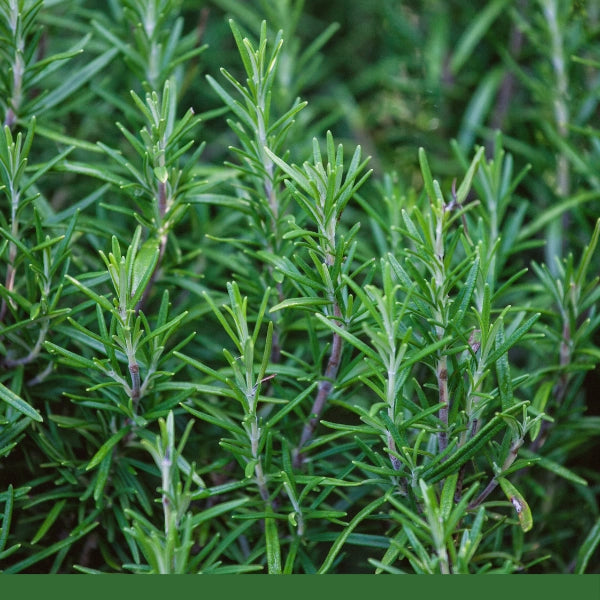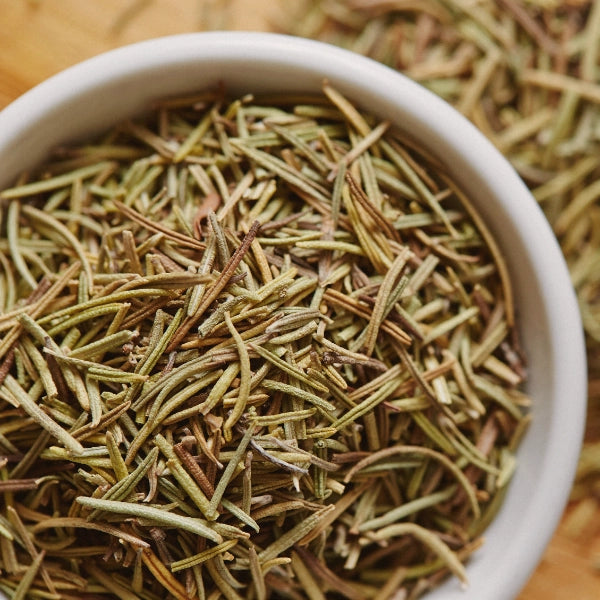Your shopping cart
Rosemary Leaf (Rosmarinus officinalis) - Dried Herb, Organic
- Regular price
- $106.90
- Sale price
- $106.90
- Regular price
-
- Unit price
- per
Couldn't load pickup availability


Rosemary is a woody, perennial herb with aromatic, evergreen, needle-like leaves and white, pink, purple, or blue flowers. Rosemary is a member of the mint family, which includes Sage, Savory, Marjoram, Oregano, Hyssop, Thyme, Lavender, Spearmint, and Peppermint.
This herb is native to the Mediterranean and naturalized worldwide. The name Rosemary derives from the Latin words "ros", meaning dew and "marinus", meaning sea – a dew of the se". Possibly reference to the herb’s preference of growing along the seashore in its natural habitat.
According to Greek legend, Rosemary was draped around the neck of Aphrodite as she rose from the sea. Rosemary has been in culinary use since at least 500 BC. Dating back to ancient Egypt sprigs of Rosemary were laid across the coffin or upon a tombstone and this custom continued well into the medieval period and beyond.
During the Middle Ages, Rosemary was used to dispel negativity, hung outside to thwart evil, tucked under pillows to stop nightmares and visits from evil spirits. Rosemary was also burned in house holds to keep the black plague from entering.
Rosemary has been used as a brain tonic in Chinese traditional medicine for thousands of years, possibly naturalized there as early as 220 AD. In Traditional Chinese Medicine, Rosemary is known for its ability to tonify yang, disperse cold, resolve dampness, expel wind and resolve phlegm.
Historically used for its traditional benefits and to help alleviate muscle pain, improve memory, promote hair growth, treat dandruff, support the immune and respiratory system and stimulate the circulatory system.
Cultivated by the Spanish in the 13th century, Rosemary became a popular condiment for salted meats. Rosemary was naturalized to North America early European settlers in the beginning of the 17th century and soon was spread to South America.
Rosemary is commonly baked into breads and crackers and used as a rub for pork and lamb. Food manufacturers add Rosemary to meats and sauces as an antioxidant and stabilizer; and the herb is used to make liqueurs such as Benedictine and Danziger Goldwasser.
Properties:
The taste and energetics of Rosemary are aromatic, pungent, a lemon-piney flavour, warming, drying and stimulating. Rosemary has an affinity to the brain, circulatory system, respiratory system, immune system, musculoskeletal system and skin.
How to use:
1/2 to 1 teaspoon of Rosemary to one cup of boiling water. Steep for 15 minutes, strain and drink up to three cups a day.
Use as a steam for the sinuses.
Cautions & contraindications:
Ingestion of large quantities of rosemary may cause stomach and intestinal irritation. Rosemary may affect the blood's ability to clot effecting Antiplatelet and anticoagulant drugs (blood thinners). People with high blood pressure or on blood pressure medication should avoid ingesting rosemary medicinally.
This information is for educational purposes only and is not intended to diagnose, treat or cure any disease or illness. Please consult your healthcare provider prior to the use of this product if you are pregnant, nursing, taking medications or have a medical condition. Individual results may vary.
This herb is native to the Mediterranean and naturalized worldwide. The name Rosemary derives from the Latin words "ros", meaning dew and "marinus", meaning sea – a dew of the se". Possibly reference to the herb’s preference of growing along the seashore in its natural habitat.
According to Greek legend, Rosemary was draped around the neck of Aphrodite as she rose from the sea. Rosemary has been in culinary use since at least 500 BC. Dating back to ancient Egypt sprigs of Rosemary were laid across the coffin or upon a tombstone and this custom continued well into the medieval period and beyond.
During the Middle Ages, Rosemary was used to dispel negativity, hung outside to thwart evil, tucked under pillows to stop nightmares and visits from evil spirits. Rosemary was also burned in house holds to keep the black plague from entering.
Rosemary has been used as a brain tonic in Chinese traditional medicine for thousands of years, possibly naturalized there as early as 220 AD. In Traditional Chinese Medicine, Rosemary is known for its ability to tonify yang, disperse cold, resolve dampness, expel wind and resolve phlegm.
Historically used for its traditional benefits and to help alleviate muscle pain, improve memory, promote hair growth, treat dandruff, support the immune and respiratory system and stimulate the circulatory system.
Cultivated by the Spanish in the 13th century, Rosemary became a popular condiment for salted meats. Rosemary was naturalized to North America early European settlers in the beginning of the 17th century and soon was spread to South America.
Rosemary is commonly baked into breads and crackers and used as a rub for pork and lamb. Food manufacturers add Rosemary to meats and sauces as an antioxidant and stabilizer; and the herb is used to make liqueurs such as Benedictine and Danziger Goldwasser.
Properties:
The taste and energetics of Rosemary are aromatic, pungent, a lemon-piney flavour, warming, drying and stimulating. Rosemary has an affinity to the brain, circulatory system, respiratory system, immune system, musculoskeletal system and skin.
How to use:
1/2 to 1 teaspoon of Rosemary to one cup of boiling water. Steep for 15 minutes, strain and drink up to three cups a day.
Use as a steam for the sinuses.
Cautions & contraindications:
Ingestion of large quantities of rosemary may cause stomach and intestinal irritation. Rosemary may affect the blood's ability to clot effecting Antiplatelet and anticoagulant drugs (blood thinners). People with high blood pressure or on blood pressure medication should avoid ingesting rosemary medicinally.
This information is for educational purposes only and is not intended to diagnose, treat or cure any disease or illness. Please consult your healthcare provider prior to the use of this product if you are pregnant, nursing, taking medications or have a medical condition. Individual results may vary.

